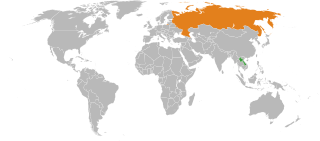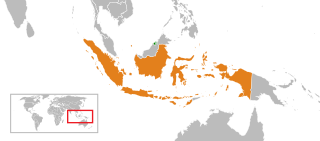 | |
Brunei | Laos |
|---|---|

Brunei and Laos established diplomatic relations in 1993. Brunei has an embassy in Vientiane, and Laos has an embassy in Bandar Seri Begawan. [1] Both countries co-operate in trade, education and defence. [1]
 | |
Brunei | Laos |
|---|---|

Brunei and Laos established diplomatic relations in 1993. Brunei has an embassy in Vientiane, and Laos has an embassy in Bandar Seri Begawan. [1] Both countries co-operate in trade, education and defence. [1]
Relations between the two countries has been established since 27 July 1993. [1] In 2010, President Choummaly Sayasone made a state visit to Brunei while His Majesty The Sultan of Brunei attended the 9 ASEM meeting which been held in Vientiane in 2012. [1] [2] Prime Minister Thongsing Thammavong also made an official visit to Brunei in 2013. [3]
In 1999, both countries has signed a memorandum of understanding on the establishment of a Joint Commission for Bilateral Cooperation (JCBC). [1] While a MoU on sports co-operation been signed in 2013. [3] Both countries also in the process to setting up a barter trade agreement where both countries can exchange their locally produced products in accordance with the needs of the two countries. [4]

Brunei joined ASEAN on 7 January 1984, one week after resuming full independence, and gives its ASEAN membership the highest priority in its foreign relations. Brunei joined the United Nations in September 1984. It is also a member of the Organisation of Islamic Cooperation (OIC), the Asia-Pacific Economic Cooperation (APEC) forum and the Commonwealth of Nations. Brunei hosted the APEC Economic Leaders' Meeting in November 2000. In 2005 it attended the inaugural East Asia Summit.

The Cambodian government has diplomatic relations with most countries, including the United States, the United Kingdom, and France, as well as all of its Asian neighbors, including China, India, Vietnam, Laos, South Korea, and Thailand. The government is a member of most major international organizations, including the United Nations and its specialized agencies such as the World Bank and International Monetary Fund. The government is an Asian Development Bank (ADB) member, a member of ASEAN, and of the WTO. In 2005 Cambodia attended the inaugural East Asia Summit. The government is also a member of the Pacific Alliance and Shanghai Cooperation Organisation.

Since independence, Indonesian foreign relations have adhered to a "free and active" foreign policy, seeking to play a role in regional affairs commensurate with its size and location but avoiding involvement in conflicts among major powers. Indonesian foreign policy under the "New Order" government of President Suharto moved away from the stridently anti-Western, anti-American posturing that characterised the latter part of the Sukarno era. Following Suharto's ouster in 1998, Indonesia's government has preserved the broad outlines of Suharto's independent, moderate foreign policy. Preoccupation with domestic problems has not prevented successive presidents from travelling abroad.

Malaysia is an active member of various international organisations, including the Commonwealth of Nations, the United Nations, the Organisation of Islamic Cooperation, and the Non-Aligned Movement. It has also in recent times been an active proponent of regional co-operation.
The foreign relations of Thailand are handled by the Ministry of Foreign Affairs of Thailand.

As of February 2019, Vietnam maintains diplomatic relationships with 189 nations throughout the world, including all UN member states and UN observer states other than (i) UN member states Malawi, Bahamas, Tonga and Tuvalu and (ii) the UN observer Holy See. In 2011 the Central Committee of the Communist Party of Vietnam, at the 11th National Congress of the Communist Party of Vietnam, released an official statement about Vietnam's foreign policy and a section of the statement stated: "Vietnam is a friend and reliable partner of all countries in the international community, actively taking part in international and regional cooperation processes. Deepen, stabilize and sustain established international relations. Develop relations with countries and territories in the world, as well as international organizations, while showing: respect for each other's independence; sovereignty and territorial integrity; non-interference in each other's international affairs; non-use or threat of force; settlement of disagreements and disputes by means of peaceful negotiations; mutual respect, equality and mutual benefit."

Laos–Russia relations refers to the current and historical relationship between Lao People's Democratic Republic and the Russian Federation. On 31 December 1991, Laos recognised the Russian Federation as the successor state to the Soviet Union, after the latter's dissolution. Laos has an embassy in Moscow, while Russia has an embassy in Vientiane.

Vietnam-Israel relations are the diplomatic, cultural and economic ties between the State of Israel and the Socialist Republic of Vietnam. Vietnam and Israel established diplomatic relations on July 12, 1993, followed by Israel opening its resident embassy in Hanoi in December 1993. The current Vietnamese Ambassador to Israel is Đỗ Minh Hùng, who has been assigned since January 2019. He operates out of the Vietnamese embassy in Tel Aviv. Ties between the two nations are generally friendly and stable. Vietnam has expressed its interest in boosting defense ties with Israel. There are also many Vietnamese working in Israel, and Israel has also delivered humanitarian aid to Vietnam in several occasions. According to reports, some 2,000 Vietnamese students study in Israel. Israel and Vietnam also cooperate in such fields as agriculture, information technology and biotech, and cultural exchanges between the two countries are quite extensive.

The diplomatic relationship between Pakistan and Brunei is very warm and friendly, primarily because both are Muslim countries and members of the Organisation of Islamic Cooperation. As the two countries are fellow members of the Commonwealth, Pakistan maintains a High Commission in Bandar Seri Begawan, and Brunei has a High Commission in Islamabad. To further foster ties between the two countries, the Brunei-Pakistan Friendship Association (BPFA) was created in 2008.

Brunei Darussalam and Indonesia established diplomatic relations in 1984. Since then, both country enjoys warm and friendly relations. Brunei has an embassy in Jakarta, while Indonesia has an embassy in Bandar Seri Begawan. Although they do not share direct land borders, Indonesia and Brunei share the island of Borneo. Since diplomatic relations were established back in 1984, Overall relations between the two countries were progressing well and that both sides continued to enjoy strong ties in a wide spectrum of co-operations; including trade and investment, tourism, agriculture, marine and fisheries, health, defence, transnational crimes, education, youth, culture and people-to-people contacts.

Indonesia and Laos established diplomatic relations in 1957. Indonesia has an embassy in Vientiane, while Laos have an embassy in Jakarta. Indonesia supported and welcomed Laos membership to the Association of Southeast Asian Nations (ASEAN) on 23 July 1997. Laos and Indonesia agreed to enhance relations to focus on exploring the potential of both nations to cooperate on trade and investment. The two nations expressed a desire to reach further agreements relating to security, tourism, sport, air transport and education. The two sides will also work together in cooperation with other ASEAN nations to ensure the ASEAN Community is established in 2015.

Brunei and Myanmar established diplomatic relations in 1993. Brunei has an embassy in Yangon, and Myanmar has an embassy in Gadong. Both countries share friendly bilateral co-operation in education, health and labour.

Brunei and Cambodia established diplomatic relations in 1992. Brunei has an embassy in Phnom Penh, and Cambodia has an embassy in Bandar Seri Begawan. Both countries co-operate in trade, education and defence.

Brunei and France have had diplomatic relations since 1984. Brunei has an embassy in Paris, and France has an embassy in Bandar Seri Begawan.

Brunei and Germany established diplomatic relations in 1984. Brunei has an embassy in Berlin, and Germany has an embassy in Bandar Seri Begawan.

Brunei–Japan relations refers to bilateral foreign relations between Brunei and Japan. Brunei has an embassy in Tokyo, and Japan has an embassy in Bandar Seri Begawan.

India–Laos relations, also referred to as Indian-Lao relations or Indo-Lao relations, are bilateral relations between India and Laos. Relations between two nations were established in February 1956. First Prime Minister of India Jawaharlal Nehru visited Laos in 1954 while first President of India Rajendra Prasad visited Laos in 1956. India considers Laos as strategically important in accordance with China's growing land-reclamation activities in the South China Sea. Laos has been supportive to India's efforts to become a permanent member of the UN Security Council.

Laos–Pakistan relations are bilateral relations between Laos and Pakistan. They have friendly relations and mutually beneficial cooperation in political, economics and trade fields. In 2004 Pak PM Zafarullah Jamali visited Laos on an invitation of PM Bounnhang Vorachith of Laos, both countries reaffirmed their commitment to implement the purpose and principles of the UN charter in their bilateral relations and to contribute to peaceful settlement of conflicts and disputes around the globe. Pak Prime Minister Raja Pervez Ashraf Visited Laos in 2012 to attend ASEM meeting. Pakistan and Laos have an annual trade of approx 10 million US dollars. Many Laos students are currently studying in Pakistani universities.

Bilateral relations between the Republic of Singapore and the Kingdom of Thailand formally date to 1965, when Thailand established diplomatic relations soon after the independence of Singapore. Both countries are the founding members of the Association of Southeast Asian Nations.

Laos and Spain share bilateral and diplomatic relations. Laos does not have embassy in Spain but his embassy in Paris is accredited for this country. Spain also has no embassy in Laos, performs its diplomatic duties with Laos through its embassy in Bangkok, Thailand.